The Checker Maven
The World's Most Widely Read Checkers and Draughts Publication
Bob Newell, Editor-in-Chief
Published every Saturday morning in Honolulu, Hawai`i
Noticing missing images? An explanation is here.
The Double Steal
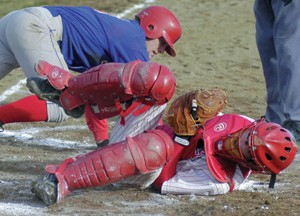
As we write this article, the 2005 World Series of baseball has begun, although when you read it, the title may already have been decided. Did the Astros complete their "Double Steal" and go all the way?
Regardless of the answer to that question, though, we invite you to "go all the way" to the solution of today's feature problem, a "double steal" theme by Tom Wiswell. You're sure to have an easier time of it than the Cards had with the Astros!
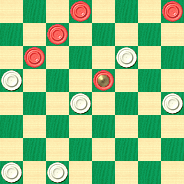
WHITE
White to Play and Win
White is a man up, but Black is going to even the score on his next move. Still, there is a way for White to recover the win.
Keep your eye on the ball, work out the answer, and then click on Read More when you've reached home plate in your solving.![]()
Checker School: Coming From Behind, Part 1

It's happened to any checkerist who has ever played beyond the starting position. We've gone a man down and we're looking for a way to at least save the draw. In the next few articles in our Checker School series, we'll have a look at some classic man-down draw positions. Now, depending on where you are in your checker career, this may be new material or just review. But either way, we're certain that knowledge of these positions will pull you out of many a predicament.
This month we'll start with a position attributed to A. Sinclair. Our solution and commentary is from Boland's classic work, Famous Positions in the Game of Checkers.
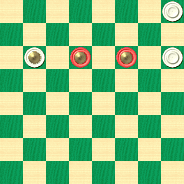
BLACK
Black to Play and Draw
Black is a man down, but he has two kings, to White's one, and the two White men are jammed on the single-corner side of the board. So Black might have a chance to rescue the situation.... but how?
Try this one out, and then click on Read More to nail down the technique.![]()
A Bit of a Break --- for Coffee and Cake?

We'll give you a bit of a break with this month's easier stroke problem --- or will we?
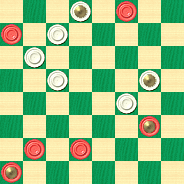
WHITE
White to Play and Win
You be the judge. Try out this puzzler, decide for yourself whether or not we've been easy on you, click on Read More to verify your solution, and then give yourself a break. We recommend that most delectable staple of checkerdom, coffee and cake.![]()
Another Two Not So Easy Pieces
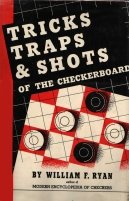
BLACK
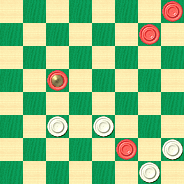
WHITE
White to Play and Win
'Ordinarily,white's cause in Example 15 would be hopeless. With the pieces even, and black's king on square 14 in a powerful center-of-the-board position, and the black piece on square 27 about to be crowned, further play seems to be futile. Despite all these symptoms of distress, white can engineer a flashy cul-de-sac in four of his own moves by resort to a "hook-up triple" or "aligned triple take." Alignment is the chief implement of all stroke and shot play. It means using ideas to force pieces onto certain squares by squeezing or pitching, so as to align (place) several pieces in position for successive capture. Can you force a triple take in Example 15? That's all there is to it!
BLACK
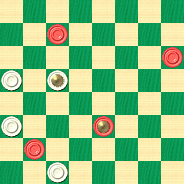
WHITE
White to Play and Win
Nothing so delights the beginner as a sweeping coup in which a number of pieces are swept from the board in one series of jumps. A casual glance at Example 16 does not impart the slightest suggestion of an impending coup, but nevertheless a "delayed long range triple" is in the offing. The white king on square 14, with the help of the piece on 21, makes a few well-forced preliminary moves and then, presto! the game is suddently climaxed with a ripping three-for-one shot, using what is known as a "throwback" technique. This give-away hint should enable rookie readers to develop some crafty ideas on how to handle the white pieces to make a win.'![]()
A Turning Point?
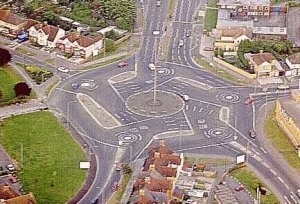
Found on the web, in an otherwise serious and rather well done review of the Chessmaster for Xbox product:
"There comes a time in a personís life where they feel the urge to make the leap from checkers to chess. This is considered a turning point in an individualís mental development - the move from king meís (sic) to En Passantís (sic) is huge and requires excellent coaching and practice, practice, practice."
The Checker Maven isn't about to launch into one of those hackneyed checkers-vs.-chess debates; we play both games, and find depth and challenge enough for a lifetime in either one.
But, a turning point in one's mental development?
We'd wager a month's beer that the reviewer has never experienced checkers at anything much beyond the toybox level. In fact, we've personally invited him to drop by The Checker Maven website and try out a few of our simpler problems.
That just might turn out to be, in fact, a turning point in one individual's mental development.![]()
Brian's Twin


Well, there is really only one Brian Hinkle, but frankly, we're grateful for that much, as Brian has been a stalwart supporter and contributor to the work of The Checker Maven, as well as a top player and reknowned analyst and problem composer in his own right.
A Twin is a problem that has the same outcome no matter whose turn it is to move, and Brian kindly provided us with this sparkling example, which is a creation of his own.
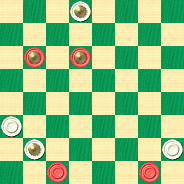
BLACK
Either to Move, Black Wins
Can you solve both parts of this twin, and determine the winning moves whether White or Black goes first? If so, you're likely to agree with Al Darrow, who called it the finest twin he had ever seen.![]()
Richard Pask's 'The Golden Dozen'
The Checker Maven is privileged to offer for free download Grandmaster Richard Pask's latest work, The Golden Dozen, a comprehensive examination of the newest additions to the three-move deck. You can download this 55 page book in PDF format via the link in the Downloads section in the right-hand column, or simply by clicking here. Our thanks to Mr. Pask for allowing us to host this work on our website.![]()
Make Your Own 3-Move Card Decks!

"One file is the back of the card, another is the first 10 cards, and the third is the last of the 5 cards (twice to not waste labels.) So if you print the first two files twice and the last file once, you will have 2 full decks. I added the 14th move card on barred openings as a bonus (and again just to not waste a card.) They are designed to work with Avery 5371 labels. I printed out a set and laminated them and they seem fine."
You can get everything you need by clicking on the 3-Move Deck entry in the Download section in the right-hand column, or just click right here.
Our thanks to Bob for sending this our way.![]()
Will The Real Doogz Please Stand Up?
Lest you be mistaken, this isn't the Doogz to whom we refer, (in fact it isn't Doogz at all) and today's problem has nothing to do with that new British genre of music known as grime, nor are we concerned with the London grime musician formerly known as Doogz, and who now calls himself Durrty Goodz.
Instead, we're talking about a checker player from Glasgow, Scotland, named Douglas, and who uses the name Doogz on the It's Your Turn game site. Douglas, or Doogz, was kind enough to send us the following problem.
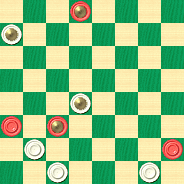
WHITE
White to Move and Win
There are several branches in the solution, and full credit is only obtained if you find them all. Are you up to this rather "grimy" challenge? Try it out, and then click on Read More when you've "come clean" and are ready to check your results.![]()
GUI Checkers: A Solid Entry
Some years ago, Jon Kreuzer started work on a checker playing program as an experiment in developing game-tree searching code. The experiment was refined over time, and when a graphical-user interface (GUI) was added, Jon gave his program a logical name: GUI Checkers. (You can click on the screen-shot above for a much more detailed full-sized version.)
The nascent GUI Checkers got the attention of world-class checker programmer Martin Fierz (creator of CheckerBoard and the Cake series of engines), and Jon was inspired to invest additional effort to improve GUI's playing strength and features.
The result is before us today: GUI Checkers release 1.00, and it is most impressive.
We put GUI through its paces here at The Checker Maven, first running our standard test against Simple Checkers. GUI won easily, and we wondered just how far GUI might go. We next tested against Marujito 1.08a, which itself can defeat Simple Checkers. GUI won that encounter as well. So we kept pushing. We then ran GUI against the solid Class B engine Damas 99. (Class B engines easily defeat Simple Checkers and are quite strong, but short of world class.) The result was an interesting draw (click here for animation), played without error or missed opportunity on either side.
But we had a hunch, and so we played GUI against Nexus, the strong forerunner of the world-class Nemesis program. Amazingly, GUI won the encounter! Of course, one game doesn't tell the whole story, but the win was most impressive. Here's the situation, and we invite you to find the winning line before clicking on Read More for the solution and full game animation.
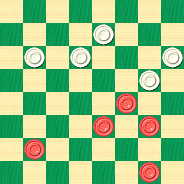
BLACK
Black to Play and Win
GUI 1.00 is thus established as a top Class B entry. It doesn't beat KingsRow or Cake Manchester, but it certainly plays a very worthy game. GUI features a small opening book and a small endgame database, a really nice look and feel, and some serious-minded features such as FEN and PDN import and export.
Author Jon Kreuzer granted the The Checker Maven an interview, and we learned that while he has produced an extraordinary checker engine, he has a more general interest in board game programming, having started with an Othello playing program while at Cornell University, and also having a strong chess playing engine to his credit. He has a current interest in 3D programming, as evidenced at his web site, 3D Kingdoms.
In talking about GUI Checkers, Jon points out that the program is open source and is probably the strongest open source checker program to be found. He does not have ambitions to advance it to the world-class category, but nevertheless has additional ideas on how to make it stronger and add features. He's especially interested in improving the opening book.

GUI Checkers author Jon Kreuzer
We asked Jon if he ever thought checkers would be completely "solved." He thought that perhaps it might, and that could limit his interest in further checker programming, but held out hope for the rest of us: "I don't think it should affect games between people." Well said, Jon, and congratulations on your fine achievement with GUI Checkers!
(GUI Checkers can be obtained from the author's web site, and it's well worth your while to do so.)![]()
The Checker Maven is produced at editorial offices in Honolulu, Hawai`i, as a completely non-commercial public service from which no income is obtained or sought. Original material is Copyright © 2004-2026 Avi Gobbler Publishing. Other material is public domain, AI generated, as attributed, or licensed under CC1, CC2, CC3 or CC4. Information presented on this site is offered as-is, at no cost, and bears no express or implied warranty as to accuracy or usability. You agree that you use such information entirely at your own risk. No liabilities of any kind under any legal theory whatsoever are accepted. The Checker Maven is dedicated to the memory of Mr. Bob Newell, Sr.



